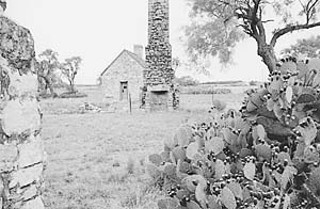Day Trips
By Gerald E. McLeod, Fri., Sept. 19, 2003

Fort Phantom Hill never had much of a chance as a military post or as a settlement 14 miles north of modern-day Abilene. More than 150 years after its establishment, 13 rock chimneys stand as silent sentinels to the Army's efforts to colonize the West Texas plains that died primarily due to the lack of a reliable water source.
As you approach from the north on FM 600, the chimneys seem to rise from a high point on the flat landscape. But the closer you get, the hill seems to disappear and seems to be only a modest change in the elevation. Such was the illusion that gave the fort its name.
Actually, the fort never officially had a name during its four years of occupation. While the other frontier forts established at the time, McKavett, Chadbourne, and Belknap, honored fallen soldiers, this outpost was referred to as the "Post on the Clear Fork of the Brazos River." It became known as Phantom Hill after the Army left.
Another one of those misnamed places in Texas, the Clear Fork of the Brazos River is anything but clear, at least in this part of the state. The winding stream north of the fort is a muddy, red color when it is running and a series of brackish pools during periods of drought.
Creeks, springs, and even wells proved unreliable during long dry periods, making a lonely assignment even more unbearable. Five companies of the 5th U.S. Infantry received the exasperating detail of trying to control roving bands of Comanches who preyed on travelers heading to the California gold fields.
After serving valiantly in the Mexican-American War that ended in 1848, the 5th Infantry stood little chance against the expert horsemen of the Plains Indians. After enduring a brutal winter upon arrival at Fort Phantom Hill in November 1851, the soldiers set about building the fort the following spring when an expert stonecutter arrived. His name lost to history, this mason is largely responsible for the fortitude of the three buildings that remain and the chimneys that mark the location like tall headstones.
Even during the best of times, the fort never resembled Hollywood's version of a Western fort. There were no log palisades. Lumber was in short supply, with the nearest stand of good trees more than a day's ride away. Fortunately, the quarry was only six miles south of the location. With the exception of the stone powder magazine, guardhouse, and commissary storehouse, the 30 buildings that housed 300 soldiers were of jacal construction: vertical sticks tied together and covered with mud and a thatch roof.
By 1854, the troops had participated in no major battles, and the fort was abandoned. Within a year, most of the buildings burned from a fire of mysterious beginnings. Over the next several decades, the fort was occasionally used by soldiers and Texas Rangers, but never garrisoned.
The stone buildings were used by the Southern Overland mail route and the Butterfield Stagecoach prior to the Civil War. A town grew up around the ruins between 1875 and 1881 but died when Anson became the county seat of Jones County and the railroad passed through Abilene. Ironically, Fort Phantom Hill Reservoir, which supplies water to Abilene, was built two miles south of the fort that suffered from the lack of water.
The post was one of the few forts in Texas built on private land. The absentee landowners hoped the Army occupation would increase the land's value. It never did. Today, the 22-acre site is owned by the Fort Phantom Foundation. The ghost fort on FM 600 is open free of charge to the public. No accommodations are provided at the site other than a brochure and a few signs, but that adds to its romantic charm. This is one historic site where your imagination must fill in the gaps.
On Saturday, Oct. 25, more than 100 historians will gather at the fort for the annual Fort Phantom Hill Rendezvous. Re-enactors in period costumes of Native Americans, cowboys, soldiers, and camp followers will demonstrate 1800s crafts, give stagecoach rides, and bring the fort back to life, if only for a day. For more information, call 325/677-1309 or visit the Web site at www.fortphantom.org.
641st in a series. Day Trips, Vol. 2, a book of Day Trips 101-200, is available for $8.95, plus $3.05 for shipping, handling, and tax. Mail to: Day Trips, PO Box 33284, South Austin, TX 78704.








